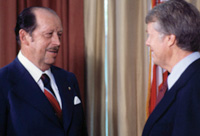Paraguay's Fascist Dictator (1954 - 1989)

Stroessner meeting with
President Carter in 1977.
Carter said: "We have President Stroessner here with his Foreign Minister and other dignitaries to participate in the signing of a treaty between ourselves and Panama. We had an opportunity to discuss subjects of interest to our country and to Paraguay, to reemphasize the historic friendship that has bound our countries together, to discuss the present plans in Paraguay for the development of the country's economy, and also we made plans, I believe, to alleviate any differences of opinion that might exist between our country and Paraguay.
The President outlined the plans for elections in February and offered us an opportunity to come and observe the elections there. I told him that I might learn how to conduct a better campaign if I could see how the elections were conducted in Paraguay.
We had a discussion about the question of human rights and the fact that it has been a problem. And the President outlined to me the progress that is being made in this area." (September 6, 1977)
Stroessner seized power in 1954, after leading a golpe de estado against President Federico Chavez. His subsequent decades as the perpetual leader of the Asociacion Nacional Republicana/Partido Colorado were characterized by massive corruption, endemic human rights abuses and systematic acts of violence against purported "enemies of the state." Stroessner also provided hospitality to a wide array of former Nazi leaders following World War II, including the concentration camp experimenter Dr. Josef Mengele, whom he personally protected despite repeated international demands that he be extradited to Israel. Stroessner routinely imprisoned scores of Paraguayan political opponents, some of whom later insisted that they had endured unethical medical experiments under Mengele's jurisdiction. The strongman also was notorious for his role in Operation Condor, a computerized network of intelligence agencies linking Southern Cone right-wing dictatorships via a U.S.-supplied station, whose purpose was to root out and eliminate exiled political dissidents who sought refuge in nearby nations.
Stroessner's autocratic reign ended in 1989 with a violent golpe instigated by General Andres Rodriguez, and he was forced to seek haven in Brazil. Since then, bringing Stroessner to justice was a slow and ultimately futile process. His mouthpiece, the ruling Partido Colorado, remained hesitant to reveal any details about the late dictator's pathological practices. While in exile, Stroessner was careful not to voice any controversial opinions regarding Latin American issues in order not to embarrass his hosts. He also never traveled outside of Brazil, hoping to avoid the fate of his Chilean counterpart Augusto Pinochet, who was arrested on charges of genocide and terrorism while traveling to London in 1998 on medical grounds. He died in 2006 at the age 93, successfully avoiding justice.
As dictator, Alfredo Stroessner, received $146 million in US aid, never receiving condemnations for its human rights abuses, the genocide of the indigenous Ache, drug trafficking and open arms policy for ex-Nazis until the 1980s. The condemnation shortly preceded a 1988 coup.
